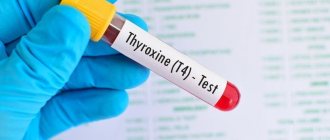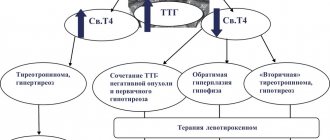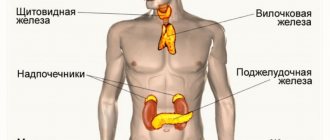Endocrine system - functions. How the endocrine system works
The content of the article
The job of the endocrine system is to control all physiological functions of the body. This complex network of glands located in different parts of the body is responsible for homeostasis - internal balance.
Endocrine system
Along with the nervous system and regulation at the tissue level, the endocrine system forms a highly specialized internal “processor” that controls all our vital parameters. When any part of the hormonal computer goes wrong, we immediately feel it.
What are the symptoms of hormonal disorders? Unpleasant sensations may arise from various organs; it also happens that other glands try to take over the functions of those that have stopped working properly.
Pituitary gland and hypothalamus
The hypothalamus is a kind of connecting link between the endocrine and nervous systems, since it simultaneously belongs to both. It is he who controls and combines endocrine regulatory mechanisms with nervous ones. In it, in response to signals received from the central and autonomic nervous system, so-called neurohormones are synthesized, which are responsible for regulating the production of their own hormones by other endocrine glands. It also controls the work of the pituitary gland, which is the central organ of the endocrine system and has the greatest influence on the activity of its other components.
It is the hypothalamus that is able to give the pituitary gland the command to increase or slow down the production of all other hormones in the body.
Adrenocorticotropic hormone
Adrenocorticotropic hormone (ACTH) is a peptide hormone that is synthesized by the anterior pituitary gland under the influence of neurohormones produced by the hypothalamus. It is responsible for initiating the synthesis of cortisol in the adrenal glands, as well as androgens, i.e. male sex hormones. In this case, adrenocorticotropic hormone, which is also called corticotropin, helps to increase the sensitivity of peripheral tissues to the action of corticosteroids. To a lesser extent, it is responsible for the occurrence of biochemical processes responsible for the formation of bone tissue in osteoblasts.
ACTH levels can fluctuate under the influence of stress, physical activity, and also change during sleep, pregnancy and depend on the phase of the menstrual cycle.
The normal level of ACTH in the blood ranges from 0 to 46 pcs/ml. The physiological peak of its production occurs at 6-8 hours, and the minimum at 18-23 hours. Its concentration may increase when:
- primary adrenal insufficiency;
- Nelson's syndrome;
- congenital adrenal hyperplasia;
- paraneoplastic syndrome;
- syndrome of ectopic ACTH production, etc.
The reason for the increase in ACTH levels in the blood may be taking medications containing calcium gluconate, insulin, vasopressin, estrogens, corticosteroids, spironolactone, lithium, methopriron, ethyl alcohol.
If increased ACTH production persists for a long time, an increase in the size of the adrenal glands may be observed, as well as the accumulation of cholesterol, ascorbic and pantothenic acid in their cortex, which will lead to its proliferation.
A decrease in ACTH levels may be due to:
- secondary adrenal insufficiency;
- adrenal cortex cancer;
- administration of corticosteroids;
- the presence of a tumor that produces cortisol.
Vasopressin (antidiuretic hormone)
Vasopressin is a peptide hormone that is synthesized by the posterior lobe of the pituitary gland. Its main task is to narrow blood vessels, which is one of the mechanisms for regulating blood pressure levels, namely, contributing to its increase. Vasopressin is also responsible for the reabsorption of water in the kidneys, which leads to a decrease in the volume of urine excreted and the maintenance of normal water-salt metabolism. Thanks to this property, vasopressin has earned its second name - antidiuretic hormone.
With a deficiency of vasopressin, diabetes insipidus may develop.
A growth hormone
Somatotropin or growth hormone is produced by the pituitary gland and is the main regulator of the process of human growth and development. Maintaining its production at the proper level is most important for children from birth to puberty, since bone growth largely depends on it. In adults, it persists and is responsible for regulating bone density, maintaining muscle mass, and is also involved in the metabolism of fatty acids.
The highest level of somatotropin in the blood is usually observed at night. Normally, in men its concentration is 0-3 ng/ml, in women – 0-8 ng/ml.
Lack of growth hormone leads to a delay in the physical development of children, which can be caused by tumors and injuries of the pituitary gland, meningitis, or a number of congenital pathologies. In adults, growth hormone deficiency can lead to increased bone fragility, decreased muscle volume, and decreased lipid concentrations.
Excess somatotropin is observed in pituitary tumors, which are usually benign in nature. This can cause gigantism, the formation of coarse facial features, weakness, delayed sexual development, and in adults – acromegaly.
Luteinizing hormone
Luteinizing hormone (LH) is a gonadotropic hormone of the anterior pituitary gland that activates the production of sex hormones in both women and men. It stimulates the synthesis of estrogen and progesterone, and also provokes the rupture of a mature follicle in the ovary and the onset of ovulation. At the same time, LH is closely interrelated with estrogens, therefore, when their levels fluctuate, changes in LH concentration are also possible. In men, LH affects the cells of the testes, stimulating the production of testosterone in them.
An increase in the synthesis of luteinizing hormone is possible when:
- pathologies of the pituitary gland, including the formation of malignant tumors;
- polycystic ovary syndrome;
- endometriosis;
- urological pathologies;
- testicular tumors.
LH levels in women directly depend on the phase of the menstrual cycle. Normally, it increases sharply with the onset of menopause.
Symptoms of excess LH may include frequent headaches, shortness of breath, weakness, menstrual irregularities and signs of excess estrogen.
Hormone deficiency is observed when the pituitary gland is malfunctioning, severe underweight up to anorexia, and severe stress. In such situations, gastrointestinal dysfunction and weakness may occur.
Follicle stimulating hormone
Follicle-stimulating hormone or FSH is a glycoprotein hormone synthesized in the anterior pituitary gland and is directly involved in the regulation of the activity of the gonads. Its production is activated by a decrease in the concentration of sex hormones, and inhibition is activated by an increase in their level. Normally, FSH levels increase sharply before the onset of puberty with the development of secondary sexual characteristics.
With the establishment of the menstrual cycle in women, the hormone activates the process of maturation of follicles in the ovaries and prepares them for the action of LH, and also stimulates the synthesis of estrogens, i.e. interacts with them according to the feedback principle. In men, FSH influences the development of seminiferous tubules and an increase in testosterone levels, and also activates the formation and maturation of sperm in the testicles.
Excess FSH occurs with kidney pathologies, pituitary tumors, alcoholism, primary testicular failure, hypogonadism, and endometriosis. This is accompanied in women by breakthrough uterine bleeding in the absence of a direct dependence on the phase of the menstrual cycle, or by the absence of menstruation, and frequent headaches.
FSH deficiency may be present in polycystic ovary syndrome, pathologies of the hypothalamic-pituitary system, exhaustion, anorexia, and dwarfism. In such situations, the menstrual cycle is disrupted, infectious or chronic diseases of the genital organs arise, and infertility may occur.
Oxytocin
Oxytocin is a neuropeptide that accumulates in the posterior lobe of the pituitary gland and is responsible for the contraction of the muscles of the uterus and mammary ducts, which becomes especially important during childbirth and subsequent breastfeeding. In addition, oxytocin is also called the hormone of trust, since with an increase in its content in the blood, the level of empathy and affection increases.
Prolactin
Prolactin is another pituitary hormone that stimulates the normal development of the mammary glands, milk production during pregnancy, and is also responsible for maintaining lactation after childbirth. In addition, it regulates the synthesis of progesterone and inhibits the production of FSH, which ensures the maintenance of the regularity of the menstrual cycle.
High concentrations of prolactin are characteristic of:
- hypothyroidism;
- formation of tumors of the pituitary gland and hypothalamus;
- chronic renal failure;
- polycystic ovary syndrome;
- hypogonadism;
- severe stress.
This leads to the development of infertility, amenorrhea (lack of menstruation) and galactorrhea (formation of breast milk outside of pregnancy and lactation). This may be accompanied by chest discomfort and headaches.
Normally, an increased level of prolactin is observed after childbirth while breastfeeding continues, which has an anovulatory effect on the ovaries and reduces the likelihood of pregnancy.
Hormone deficiency occurs when the pituitary gland is insufficient, which is typical for:
- Sheehan's syndrome (necrosis of the pituitary gland caused by excessive blood loss during childbirth);
- injuries, surgeries, radiation therapy affecting the pituitary gland;
- taking antiepileptic drugs, some corticosteroids, dopaminergic drugs, etc.
With a decrease in prolactin concentration, increased sweating and severe thirst are observed. If a woman has Sheehan syndrome, lactation stops, followed by a gradual decrease in the size of the mammary glands, weight loss, menstrual irregularities, and decreased libido.
Thyroid-stimulating hormone
Thyroid-stimulating hormone, or TSH, is primarily responsible for producing thyroid hormones, which are responsible for maintaining normal energy levels. Therefore, when its production changes, the synthesis of thyroid hormones is immediately disrupted, which leads to the development of corresponding diseases. The causes of impaired TSH production by the pituitary gland are pathologies of the hypothalamus, as well as the thyroid gland. Therefore, increased concentrations of TSH in the blood are found when:
- hypothyroidism;
- pituitary tumors;
- preeclampsia;
- mental illness;
- adrenal insufficiency.
TSH deficiency is characteristic of diffuse toxic goiter, Plummer's disease, hyperthyroidism in pregnancy, as well as autoimmune thyroiditis and cachexia.
Pituitary gland - pituitary hormones (prolactin, endorphins, ACTH hormone and TSH hormone
The pituitary gland stimulates the growth of long bones and body growth, regulates metabolism, is responsible for the secretion and maintenance of milk in nursing mothers, stimulates the breakdown of excess fat, and also influences the development and function of the testes or ovaries. The pituitary hormones it produces include prolactin, endorphins, ACTH hormone and TSH hormone.
Pituitary hormones
What do hormones do?
Hormones cause changes in the functions of various organs according to the body's requirements. Thus, they maintain the stability of the body, ensure its responses to external and internal stimuli, and also control the development and growth of tissues and reproductive functions. The control center for the overall coordination of hormone production is in the hypothalamus
, which is adjacent to the pituitary gland at the base of the brain.
Thyroid hormones
determine the rate of chemical processes in the body.
Adrenal hormones
prepare the body for stress—the “fight or flight” state.
Sex hormones
- estrogen and testosterone - regulate reproductive functions.
Thyroid gland - thyroid hormones (thyroxine, triiodothyronine, calcitonin)
Thyroid hormones affect the functioning of the entire body, and the most important of them are: triiodothyronine (FT3), free thyroxine (FT4), calcitonin.
The thyroid gland is regulated by thyrotropin (TSH), produced by the pituitary gland, as well as hyperthyroidism and hypothyroidism, including Hashimoto's disease, one of the most common hormonal disorders today.
Pancreas - pancreatic hormones - glucagon, insulin
The most important hormones of the pancreas are glucagon, which stimulates blood glucose levels to rise, and insulin, which lowers blood sugar levels.
Biological role of glucagon
In a healthy person, insulin works with glucagon to maintain the required level of energy in the body. The most well-known disease of the pancreas is diabetes, caused by impaired insulin secretion or tissue sensitivity to the hormone. The most common types of diabetes are type 1 diabetes and type 2 diabetes.
How were hormones discovered?
The first hormone discovered was secretin
, a substance that is produced in the small intestine when food reaches it from the stomach.
Pleasure hormones
In a variety of popular texts about health you can find the mysterious phrase “pleasure hormone.” How do these hormones work and how do you get them?
Secretin was discovered by English physiologists William Bayliss and Ernest Starling in 1905.
They found that secretin is able to “travel” through the blood throughout the body and reach the pancreas, stimulating its work. And in 1920, Canadians Frederick Banting and Charles Best isolated one of the most famous hormones from the pancreas of animals - insulin
.
Male hormones
The male gonads, located in the scrotum, perform two main functions - reproductive (sperm production) and hormonal, as the site of production of male sex hormones. Their work is regulated by hormones produced by the pituitary gland.
Male androgens are steroid hormones, of which testosterone plays the most important role. Its activities include sex formation and the development of secondary sexual characteristics, stimulating the development and maturation of sperm, and regulating sexual desire.
All about hormones: what are they, how do they work, how are they used in medicine?
When a person sleeps, less adrenal hormones (stress hormones) are released and at the same time the secretion of somatotropic hormone (GH) increases - it is responsible for stimulating the growth of various tissues. The peak concentration of growth hormone occurs at 2-3 am. So the statement that we grow in our sleep is a scientifically proven fact.
Around 5-7 am, the secretion of adrenal hormones increases again, and with sunrise, melatonin ceases to be synthesized - all this helps to wake up. Also in the morning hours there is a peak in the concentration of testosterone, which is associated with the occurrence of morning erections in men.
In addition to circadian rhythms, there are also longer cycles of fluctuation in hormone levels. For example, changes in the level of female sex hormones occur at intervals of approximately 28 days and regulate the course of the menstrual cycle. Moreover, the concentration of hormones changes significantly throughout life. In adolescence, much more growth hormone is synthesized, and in old age, significantly less sex hormones are produced.
How are hormones used in medicine?
Considering the powerful and multifaceted influence of hormones on the body, many of them are widely used in medical practice. There are several main areas of their use.
The first is hormone replacement therapy (HRT). Usually this is what they mean when they tell loved ones in a tragic voice: “The doctor prescribed me hormones” and “I will never get off them,” preparing for some terrible side effects and irreversible changes in the body. In practice, everything turns out to be much more prosaic: there are almost no side effects or they disappear quickly, the person continues his normal life, and HRT has practically no effect on it.
This therapy is prescribed when the body does not produce the desired hormone in the required quantities. Given the important role of hormones, timely administration of therapy allows you to avoid serious or even irreversible health problems.
As a rule, hormonal therapy is prescribed for life, since in most cases modern medicine has not yet learned to solve the causes of such problems. And here it is important not to confuse cause with effect: the inability to “get off hormones” is not due to the influence of HRT itself, but to the fact that the insufficiency of one’s own endocrine function will not disappear anywhere.
Considering that hormones are secreted in our body almost constantly, we cannot take “breaks” or “vacations” in therapy. It is also dangerous to change the dosage without a doctor's recommendation.
Perhaps the fear of HRT is due to historical reasons: the first hormone preparations were often secreted from animal glands (for example, bovine or porcine insulin), they contained many impurities and were indeed not very well tolerated. Nowadays, modern highly purified preparations of human hormones are used for HRT - they are safe and effective.
In most cases, when prescribing hormonal therapy, dosage adjustments or discontinuation of other drugs (for example, antiretroviral therapy) are not necessary, since HRT imitates the natural functioning of the endocrine glands. But some features of the course of the underlying disease still need to be taken into account. For example, if a medicine contains glucose, maltose, sugar or other carbohydrates as excipients, their amount must be taken into account in patients receiving insulin. The effect of some ARV drugs, such as protease inhibitors, on liver enzyme activity should also be considered. If the appropriate liver enzymes are involved in the breakdown of the prescribed hormonal drug, the dose of the hormone may need to be adjusted - this is checked and taken into account by the doctor.
Can hormones treat diseases not related to hormones themselves?
Yes, this is another direction of their use. For example, adrenaline increases blood pressure by contracting blood vessels and increasing heart function. Therefore, it is used to treat shock conditions when it is necessary to quickly increase blood pressure. And glucocorticoid hormones have a powerful anti-inflammatory effect, and they suppress the reactions of the immune system, so they are very widely used in the treatment of allergic diseases, bronchial asthma and other chronic inflammatory diseases.
In many cases, a “natural” hormone, in addition to having a beneficial effect for treating a disease, also has undesirable effects. Male sex hormones have a powerful anabolic effect - they enhance protein synthesis and muscle growth. This is useful in treating people with severe debilitation (for example, after severe burns). But at the same time, they affect the sexual sphere, increase aggressiveness, and can lead to excessive enlargement of the prostate gland.
You can reduce unnecessary “extra” effects using synthetic and semi-synthetic analogues. That is, substances are selected that are close in chemical structure to the natural hormone, but at the same time their “needed” effect is more pronounced, and the “extra” ones are minimized. It was in this way that anabolic steroids were obtained from natural male sex hormones - they stimulate protein synthesis more strongly and have less effect on the sexual sphere than testosterone. Nowadays, synthetic analogues of hormones are used much more often than natural hormones themselves.
Hormone antagonists are also used in medicine. These are substances that bind to the natural hormone receptor on the cell surface, but do not have a characteristic effect. Such substances are often used to treat diseases associated with excessive secretion of the hormone or when even “normal” concentrations are harmful. For example, some malignant tumors actively grow under the influence of certain hormones, and in order to stop the growth of the tumor, you need to “turn off” the action of the hormone. Thus, prostate tumors often require the stimulating influence of testosterone to grow. One treatment option is to prescribe bicalutamide. This drug binds to the testosterone receptors of the tumor, blocks the effects of testosterone and inhibits tumor growth.
When prescribing hormonal drugs against the background of other therapy, including ART, a mandatory check of drug compatibility is required, as in the case of co-prescribing any other drugs.
Why do transgender people take hormones? And how does it work?
Sex hormones influence not only the development and function of the reproductive system, but also the development of secondary sexual characteristics, shaping a “male” or “female” appearance. Therefore, taking sex hormones is often an important part of the transgender transition: such therapy affects appearance much more than surgical operations.
Hormonal disorders
All alarming symptoms that may indicate dysfunction of one or more endocrine glands should be reported to an endocrinologist. In any case, only this doctor treats such disorders, and when contacting another specialist, he will still redirect the patient to a hormonal specialist - an endocrinologist.
ONLINE REGISTRATION at the DIANA clinic
You can sign up by calling the toll-free phone number 8-800-707-15-60 or filling out the contact form. In this case, we will contact you ourselves.
How to take medications correctly
There are a number of rules that are important to follow when taking medications:
- The medicine is prescribed by a doctor, indicating the individual dosage and duration of therapy.
- During the period of treatment, it is recommended to follow a diet: exclude alcoholic beverages, fatty foods, fried foods, and sweet confectionery products.
- It is important to check that the prescribed medicine has the same dosage as indicated in the prescription. It is forbidden to split pills or increase the dosage yourself.
- If side effects occur or there is no result, you must notify your doctor.







